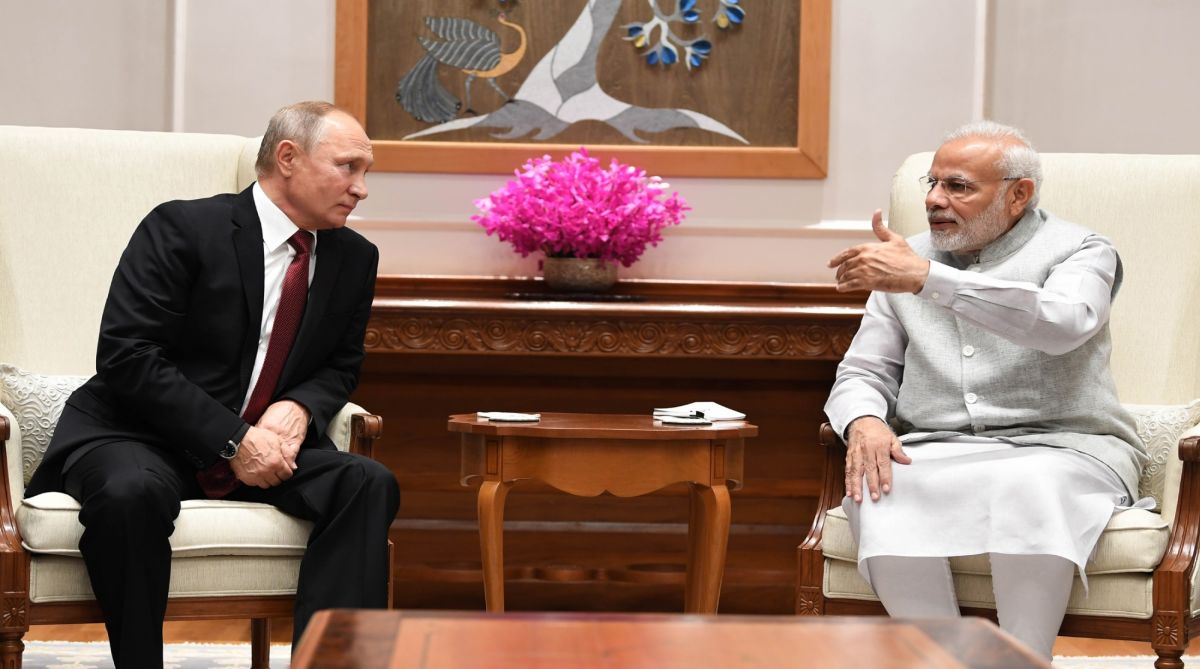K Kavitha questions Modi’s silence on Adani US bribery indictment
Political opponents are arrested without evidence and put on trial for months while Mr Gautam Adani walks free despite repeated and grave allegations, she said.
Russia and India are expected to sign the S-400 air defence system deal and a number of other pacts in key sectors such as space and energy on Friday.

Prime Minister Narendra Modi meets Russian President Vladimir Putin, in New Delhi. (Photo: IANS/PIB)
Russian President Vladimir Putin arrived in New Delhi on Thursday for the annual summit with Prime Minister Narendra Modi.
Russia and India are expected to sign the S-400 air defence system deal and a number of other pacts in key sectors such as space and energy on Friday.
Putin, who was received by External Affairs Minister Sushma Swaraj on his arrival. Later, Modi welcomed Putin with a warm hug at 7, Lok Kalyan Marg before the two sat down for a one-on-one meeting, after which PM Modi hosted a private dinner for the visiting dignitary.
Advertisement
The dinner meeting comes a day ahead of the 19th India-Russia annual summit during which the two leaders will hold comprehensive discussions on wide-ranging bilateral, regional and international issues, including US sanctions against Moscow and counter-terrorism cooperation.
The Russian President is accompanied by a high-level delegation comprising Deputy Prime Minister Yuri Borisov, Foreign Minister Sergey Lavrov and Trade and Industry Minister Denis Manturov among others during his two-day visit.
Ahead of his meeting, Modi tweeted, “Welcome to India, President Putin. Looking forward to our deliberations, which will further enhance India-Russia friendship.” The tweet was also posted in the Russian language.
Around 20 agreements are expected to be signed between the two sides at the end of the Putin-Modi talks and Putin will oversee the signing of the USD 5 billion deal.
The agreements to be signed are likely to boost cooperation in keys sectors such as defence, space, trade, energy and tourism, among others.
The spotlight will be on the S-400 missile defence system deal as, if signed, it could violate US sanctions under the Countering America’s Adversaries Through Sanctions Act (CAATSA) instituted by the US Congress on arms purchases from Russia.
The US has urged its allies to forgo transactions with Russia, warning that the S-400 missile defence system that India intends to buy would be a “focus area” for it to implement punitive sanctions against a nation undertaking “significant” business deals with the Russians.
American lawmakers, however, have allowed the possibility of a presidential waiver.
India has already given indications that it will go ahead with the deal notwithstanding the US sanctions.
“India has maintained its sovereignty as regards to its relationship with countries. We shall maintain it in all earnestness,” Defence Minister Nirmala Sitharaman told PTI recently when asked whether the US sanctions will hit India’s defence ties with Russia, especially after the signing of the S-400 missile deal.
The US earlier on Wednesday urged its allies not to enter into transactions with Russia and warned that it would trigger American sanctions.
“We urge all of our allies and partners to forgo transactions with Russia that would trigger sanctions under CAATSA,” a State Department Spokesperson told PTI when asked about India’s plan to purchase multi-billion S-400 missile defense system from Russia.
India wants to procure the long-range missile systems to tighten its air defence mechanism, particularly along the nearly 4,000-km-long Sino-India border.
S-400 is known as Russia’s most advanced long-range surface-to-air missile defence system.
China was the first foreign buyer to seal a government-to-government deal with Russia in 2014 to procure the lethal missile system and Moscow has already started delivery of an undisclosed number of the S-400 missile systems to Beijing.
The S-400 is an upgraded version of the S-300 systems. The missile system, manufactured by Almaz-Antey, has been in service in Russia since 2007.
Russia has been one of India’s key suppliers of arms and ammunition.
Sources had earlier said Modi and Putin would also deliberate on impact of US sanctions on import of crude oil from Iran.
Besides holding talks with Modi, the Russian leader will also have a meeting with President Ram Nath Kovind on Friday.
He will also interact with a group of talented children and address an India-Russia business meet.
The last annual summit was held on June 1, 2017, during the visit of the prime minister to Russia.
In May, Modi had travelled to Russian coastal city of Sochi for an informal summit with Putin during which they discussed a range of crucial issues.
(With agency inputs)
Advertisement